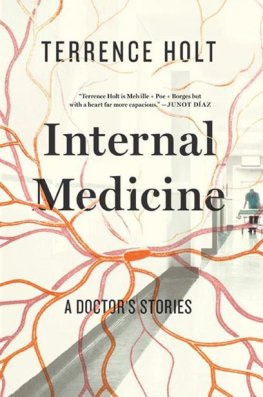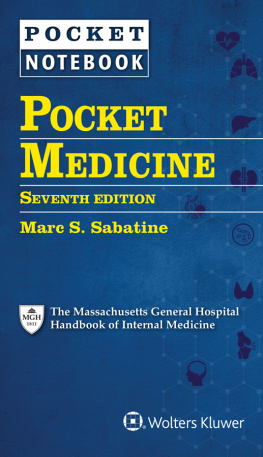Terrence Holt
Internal Medicine: A Doctor's Stories
To William E. Holt, MD
Obiit 16 Jan 1994
Curse, bless, me now with your fierce tears, I pray.
Did you ask me why a surgeon writes?
I think it is because I wish to be a doctor.
RICHARD SELZER, 1976
THIS BOOK IS THE STORY OF A RESIDENCY IN internal medicine. I wrote it over a period of ten years, beginning just after my own residency ended. The chapters appear here in an order that follows the trajectory of residency, from the first night on call to another call night some forty months later, by which time the narrator, no longer a resident, is out on his own, practicing as a hospitalist in a small town in the Midwest. I wrote this book primarily in an attempt to make sense of the process of becoming a doctor.
I first realized how much I wanted to tell this story on a day in March of my intern year, sometime between three and four in the afternoon. Im at a nursing station, where three medical teams each with its resident, interns, attending physician, medical students and two or three consult teams of similar size and composition, along with nurses, CNAs, physical therapists, occupational therapists, speech therapists, the chaplains, transport workers, dieticians, social workers, case managers, maintenance workers, and probably others Ive forgotten are all busy with the different things they do. Everyone is talking at once. At any given moment, two or three of them are trying to talk to me.
Im standing in the middle of this roar and babble. My pager is going off more or less continuously. The phones are ringing, the unit clerk is crying out names (one of which, if I could only hear him, might be mine) to come and take a call. There are visitors, family members, and patients leaning over the counters, each with some question, need, or piece of information. From time to time the hospital PA system adds to the din.
Im worried about one patient who might be hemorrhaging, another who could be going septic, and still another who simply isnt getting better for reasons no one understands. Im worried that there may be yet one more on my list that I should be worrying about, but try as I might I cant recall which one that would be. Its unlikely Ive eaten since five that morning. My feet probably hurt. I know Im tired. Details blur.
Still, I remember very clearly one day when I looked out over this scene and said to myself: This is not narratable.
This was probably not the most useful thing I could have been thinking at that moment. It was, however, true. What I glimpsed that day was that the hospital is too manifold, too layered, too many damn things happening one on top of the other ever to get it down in its entirety. If there was any way of doing justice to it, it would have to be through some kind of condensation: by transforming it into a parable that could somehow imply the whole. I wasnt sure that was possible, either.
I realized only later how much I wanted it to be possible. I needed to understand how those years in the hospital had transformed me. This collection is not called Internal Medicine for nothing.
FORWARD A COUPLE OF YEARS. Its July, the month when everything changes: new residents arrive, others advance to another year, still others graduate, as I did this particular July. My memory of the transition is hazy. I celebrated the first several weeks by falling asleep wherever I sat down.
That month I also started writing these stories. There was no premeditation in this, and certainly no intention of producing the book youre holding. That moment in which I had recognized the non-narratibility of the hospital had produced, in a kind of delayed reflex, these attempts to get down some different kind of account of what it had been like. Not a record that accurately captured every relevant detail: I knew it was not possible to capture the meaning of residency that way. What I found myself writing instead was those parables I had imagined before, using them to identify what remained mysterious, and often troubling, about the process of becoming a doctor.
I understand that anyone picking up this book is probably hoping to learn something about what goes on in residency. The hunger to get behind the scenes of institutions that keep their inner workings hidden is powerful; this is especially so around medicine. I also wrote this book to satisfy that hunger, to give a truthful account of residency and the hospital. There are barriers, however, to giving such an account, limits on what a doctor is allowed to reveal. Patients have a right to privacy, of course. But there is something more than privacy at stake. You might change a few details: a name here, a hair color there, add a few years or drop a few pounds, give that one a different diagnosis and the other an Irish accent, and thats enough to conceal your patients identity from the world at large. But thats not enough to respect the patient. As long as theres an actual, unique individual beneath that disguise, youre making a spectacle of somebodys suffering, and thats a line no one should cross. Its bad for the patient. Its not good for the writer, either.
This poses a challenge to a writer trying to offer a factual account of residency. Medicine without patients isnt a very useful story. This is why the patients in this book arent based on specific individuals, no matter how disguised. They arent facts. They are at most assemblages drawn from a variety of sources, compiled from multiple cases, transformed according to the logic not of journalism but of parable, seeking to capture the essence of something too complex to be understood any other way.
In writing these stories I have drawn on what I thought and felt and generally did as a resident, but in re-creating experience as parable I have watched the narrator of these pieces evolve into someone else. He dealt with patients different from the ones I cared for, and did so, necessarily, in ways I never did. The mistakes he makes were not mine. He sometimes thinks and feels things, or fails to, in ways he would not be proud of were they generally known. But I like to think he does a pretty good job in spite of it all. He struggles with issues I struggled with, and with which every doctor struggles. He struggles differently from the way I did, but in the end he learns things that it took me much longer to figure out. In portraying his inner conflicts I have tried to get at what the hospital teaches us. I have tried, more than anything else, to be faithful to the inner life of medicine.
As to the externalities, the bits and pieces of special knowledge that constitute much of the appeal of medical accounts: I have tried to be accurate here as well, combining multiple hospitals into one that never existed, but in which, I hope, you will recognize the next hospital you enter.
While pressing life into story, I have tried to keep other agendas from creeping in. I dont think I have reshaped events simply to generate drama. Nothing happens in these pages that doesnt happen every day in a variety of ways in hospitals everywhere. I have had to simplify what defied narrative form, and alter or suppress whatever might have compromised the respect patients deserve. But in making sense of residency within the constraints of narrative form and human decency, I have hewed as closely as possible to the lived reality of the hospital.
Chapel Hill
November 2013
MY FIRST CALL NIGHT AS AN INTERN, I RAN into Dr. M, one of the senior attendings, whom I had known for several years. Hows it going? he asked me. I told him I was on call. First call? He smiled. I remember my first call. About ten oclock that night, my resident said to me, Im going to be just behind that door. Call me if you need me. But remember its a sign of weakness.










